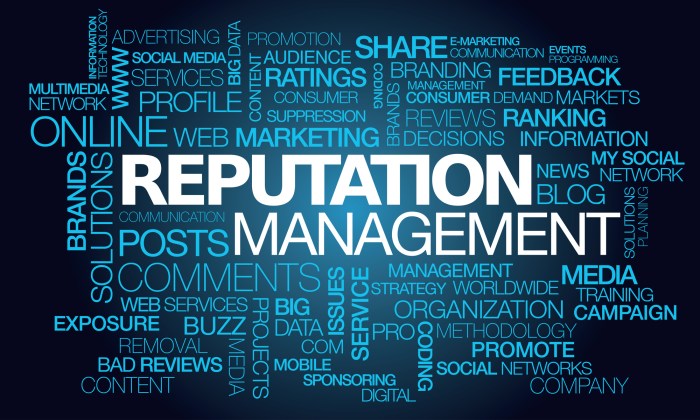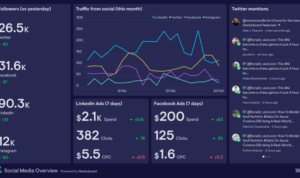Managing Brand Reputation Online opens the door to a world where businesses thrive on customer trust and loyalty. Dive into the strategies, tools, and techniques that shape a positive online presence in this digital age.
Importance of Managing Brand Reputation Online

In today’s digital age, managing brand reputation online is more important than ever for businesses. With the majority of consumers turning to the internet to research products and services before making a purchase, a positive online reputation can make or break a company.
A positive online reputation can significantly impact customer trust and loyalty. When potential customers see positive reviews, testimonials, and social media interactions, they are more likely to trust the brand and feel confident in their purchasing decisions. This trust can lead to increased customer loyalty, repeat business, and even word-of-mouth referrals.
Examples of Successful Brand Reputation Management, Managing Brand Reputation Online
- Apple: Apple has consistently managed its brand reputation online by maintaining a strong presence on social media, responding to customer feedback, and consistently delivering high-quality products.
- Amazon: Amazon has built a solid online reputation by prioritizing customer service, offering fast shipping, and providing a seamless shopping experience. This has led to high levels of customer satisfaction and trust in the brand.
- Nike: Nike has successfully managed its brand reputation by engaging with customers on social media, promoting inclusivity and diversity, and aligning its brand with social causes. This has helped Nike connect with its audience on a deeper level and build a loyal customer base.
Strategies for Building a Positive Brand Reputation Online
Building a positive brand reputation online is crucial for businesses to attract and retain customers. Here are some effective strategies to help businesses enhance their online brand image:
Utilize Social Media Platforms
Social media plays a significant role in shaping brand reputation. Businesses should actively engage with their audience on platforms like Facebook, Instagram, Twitter, and LinkedIn. By posting relevant content, responding to comments and messages, and addressing customer concerns promptly, businesses can build a strong and positive online presence.
Create High-Quality Content
Producing high-quality and valuable content, such as blog posts, videos, infographics, and podcasts, can help businesses establish themselves as industry experts. This can boost credibility and trust among consumers, leading to a positive brand reputation.
Monitor Online Reviews and Feedback
It’s essential for businesses to keep track of online reviews and feedback from customers. Addressing negative reviews promptly and professionally, and seeking solutions to customer complaints, can demonstrate a commitment to customer satisfaction and help maintain a positive brand reputation.
Collaborate with Influencers
Partnering with influencers or industry experts can help businesses reach a wider audience and improve brand visibility. Influencers can endorse products or services, creating positive associations with the brand and enhancing its reputation online.
Stay Transparent and Authentic
Transparency and authenticity are key to building trust with consumers. Businesses should be honest in their communications, admit mistakes when necessary, and showcase the human side of their brand. This can help foster strong relationships with customers and maintain a positive brand reputation online.
Monitoring Tools and Techniques: Managing Brand Reputation Online
Monitoring brand reputation online is crucial for businesses to stay ahead of potential issues and capitalize on positive feedback. Various tools and techniques are available to help companies track their online presence and manage their brand image effectively.
Social Media Monitoring Tools
- Sprout Social: Allows businesses to monitor mentions, track s, and measure engagement across multiple social media platforms.
- Hootsuite: Provides real-time analytics, sentiment analysis, and customizable reports for monitoring brand reputation on social media.
- Buffer: Helps schedule posts, track engagement, and monitor brand mentions across different social media channels.
Online Review Monitoring Tools
- Yelp for Business: Enables businesses to track and respond to customer reviews on Yelp, improving brand reputation and customer satisfaction.
- Google Alerts: Sends email notifications whenever a new review or mention of the brand is posted online, allowing for timely responses.
- ReviewTrackers: Monitors online reviews from various platforms, aggregates data, and provides actionable insights to improve brand perception.
Importance of Real-Time Monitoring
Real-time monitoring is essential for managing brand reputation effectively as it allows businesses to address issues promptly, engage with customers in a timely manner, and capitalize on positive feedback. By monitoring online conversations in real-time, companies can protect their brand image, identify potential crises, and make informed decisions to enhance their online reputation.
Crisis Management in Online Reputation

In today’s digital age, managing a crisis affecting your online reputation is crucial for businesses to maintain trust and credibility with their customers. Here, we will discuss steps businesses can take to handle such crises effectively, provide examples of companies that have successfully managed online reputation crises, and explore the long-term impacts of mishandling a reputation crisis online.
Steps to Handle a Crisis Affecting Online Reputation
- Act Quickly: Address the issue as soon as it arises to prevent it from escalating further.
- Be Transparent: Communicate openly and honestly with your audience about the situation.
- Apologize if Necessary: If your business is at fault, offer a sincere apology to those affected.
- Monitor Social Media: Keep a close eye on social media platforms for any mentions or discussions related to the crisis.
- Seek Professional Help: Consider enlisting the help of reputation management experts to guide you through the crisis.
Examples of Companies Effectively Managing Online Reputation Crises
- Johnson & Johnson: Handled the Tylenol poisoning crisis in 1982 by recalling products and being transparent about the issue.
- Southwest Airlines: Responded quickly and effectively to a viral video showing a passenger being removed from a flight.
- Starbucks: Addressed a racial profiling incident in one of its stores by implementing sensitivity training for employees.
Long-Term Impacts of Mishandling a Reputation Crisis Online
- Loss of Trust: Customers may lose trust in the brand and choose to take their business elsewhere.
- Damaged Reputation: Negative publicity from mishandling a crisis can tarnish a brand’s reputation for years to come.
- Financial Consequences: A reputation crisis can lead to loss of revenue and increased costs for the business.





